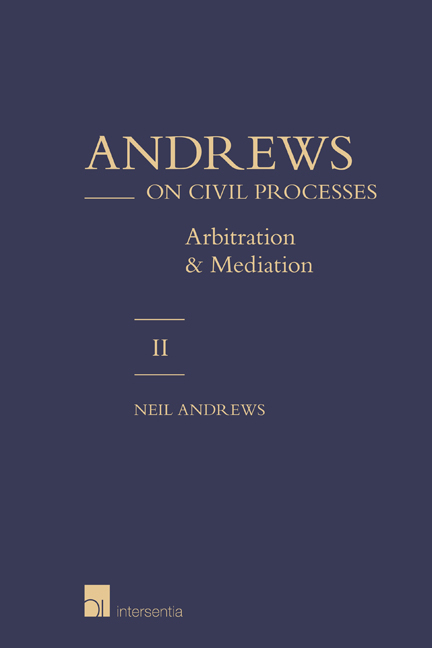Book contents
- Frontmatter
- Dedication
- CONTENTS VOLUME I
- Contents
- Table of Cases
- Table of Statutes
- Table of Statutory Instruments
- PART I MEDIATION
- PART II ARBITRATION
- Chapter 3 Commercial Arbitration: What Is It and Why Choose It?
- Chapter 4 The Major Principles of Arbitration and Litigation: A Comparison
- Chapter 5 Fundamental Features of English Arbitration
- Chapter 6 ‘The Seat’ and the Range of Relevant Laws
- Chapter 7 ‘Arbitrability’: Public Policy Limitations upon the Scope of Arbitration
- Chapter 8 A Confidential Process
- Chapter 9 Arbitration Agreements
- Chapter 10 Courts Giving Effect to Arbitration Agreements
- Chapter 11 Commencement of the Submission and Time Issues
- Chapter 12 The Tribunal's Appointment, Tenure and Immunity
- Chapter 13 Pre-Hearing Proceedings
- Chapter 14 The Hearing
- Chapter 15 Final Remedies, the Award, and Correction of the Award by the Tribunal
- Chapter 16 Fees, Expenses and Recoverable Costs
- Chapter 17 Arbitration Awards: Issues of Finality and Res Judicata
- Chapter 18 Challenges to English Arbitral Awards under English Law
- Chapter 19 English Enforcement of English Awards
- Chapter 20 Enforcement under the New York Convention (1958)
- PART III CONSUMER ADR
- Select Bibliography
- Index to Volumes I and II
Chapter 11 - Commencement of the Submission and Time Issues
from PART II - ARBITRATION
Published online by Cambridge University Press: 13 December 2017
- Frontmatter
- Dedication
- CONTENTS VOLUME I
- Contents
- Table of Cases
- Table of Statutes
- Table of Statutory Instruments
- PART I MEDIATION
- PART II ARBITRATION
- Chapter 3 Commercial Arbitration: What Is It and Why Choose It?
- Chapter 4 The Major Principles of Arbitration and Litigation: A Comparison
- Chapter 5 Fundamental Features of English Arbitration
- Chapter 6 ‘The Seat’ and the Range of Relevant Laws
- Chapter 7 ‘Arbitrability’: Public Policy Limitations upon the Scope of Arbitration
- Chapter 8 A Confidential Process
- Chapter 9 Arbitration Agreements
- Chapter 10 Courts Giving Effect to Arbitration Agreements
- Chapter 11 Commencement of the Submission and Time Issues
- Chapter 12 The Tribunal's Appointment, Tenure and Immunity
- Chapter 13 Pre-Hearing Proceedings
- Chapter 14 The Hearing
- Chapter 15 Final Remedies, the Award, and Correction of the Award by the Tribunal
- Chapter 16 Fees, Expenses and Recoverable Costs
- Chapter 17 Arbitration Awards: Issues of Finality and Res Judicata
- Chapter 18 Challenges to English Arbitral Awards under English Law
- Chapter 19 English Enforcement of English Awards
- Chapter 20 Enforcement under the New York Convention (1958)
- PART III CONSUMER ADR
- Select Bibliography
- Index to Volumes I and II
Summary
COMMENCEMENT
In the absence of special agreement defining when arbitral proceedings are ‘to be regarded as commenced’, section 14 of the Arbitration Act 1996 (England and Wales) states that (i) when the arbitrator is ‘named or designated in the arbitration agreement’, commencement occurs when a party serves notice in writing requiring the other party to ‘submit that matter to the person so named or designated’; (ii) if the parties are to appoint the arbitrator(s), the date is when one party servers notice in writing requiring the other party to appoint an arbitrator or to agree to one's appointment; (iii) when a ‘person other than a party to the proceedings’ is to appoint the arbitrator(s), the date of commen cement is when a party give notice in writing to that person requesting such an appointment.
TIME ISSUES
‘The Limitation Acts’ apply to arbitral proceedings. The relevant limitation statute might be the (English) Limitation Act 1980 (8.04, vol I), or ‘any other enactment (whenever passed) relating to the limitation of actions’, or it might be the Foreign Limitation Periods Act 1984.
As noted at 8.107, vol I, the court has a power to decide not to apply a foreign limitation period if it will lead to undue hardship.
The general rule of limitation is a six-year period. More precisely, that rule applies when English law is applied to the substance of a dispute which is, or is to be, referred to arbitration in England (the seat being England and the Arbitration Act 1996 (England and Wales) then governing the arbitration). In this situation the general rule is that a contractual claim must be brought within six years from the date when the cause of action accrued. But this is subject to these qualifications: (i) if the claim is based on a deed, the period is twelve years; or (ii) the six year rule might also be affected by one of the special factors specified in section 32 of the Limitation Act 1980 applies; or (iii) (in the case of a debt), the creditor might have acknowledged the debt or made a part payment (provided the action has not already become barred under the limitation rules) and the relevant proceedings are brought within six years (twelve, if the debt arises under a deed) from the date of that acknowledgment or part payment.
- Type
- Chapter
- Information
- Andrews on Civil ProcessesArbitration and Mediation, pp. 243 - 248Publisher: IntersentiaPrint publication year: 2013



